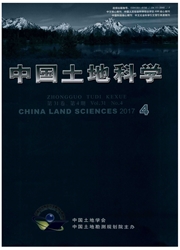

 中文摘要:
中文摘要:
研究目的:分析建设用地减量化的内涵和必要性,探讨减量化的理论基础,总结经济发达地区建设用地减量化经验,为在其他地区推行减量化提供借鉴。研究方法:以上海市为例,总结建设用地减量化经验;借助"经济新常态下土地利用方式转变与建设用地减量化研讨会"的专家研讨,研究减量化内涵、必要性和减量化中遇到的问题及相应政策建议。研究结果:(1)建设用地减量化是经济发展到一定阶段的结果;(2)建设用地减量化是中国社会、经济和生态建设的需要。研究结论:建设用地减量化政策还不完善,建议在运行机制、激励机制、经济发展驱动转型、差别化政策、三农保护、资金来源和农用地复合利用等方面进一步完善。
 英文摘要:
英文摘要:
The purpose of this paper is to analyze the connotation and necessity of reduction of construction land, to discuss its basic theories, and to summarize the experience of the reduction of construction land in the developed areasso as to provide reference for other areas. Taking Shanghai City as an example, this paper summarized the experience of construction land reduction. The connotation, necessity, problems and relative recommendations were put forward based on the workshop on "land use pattern changing and construction land in the new normal". The results indicate that construction land reduction is the outcome of the economic development. It is the demand from social, economic and ecological construction in China. The conclusion is that the policy of construction land reduction is not perfect. In the near future, it can be improved in many aspects, including operation mechanism, incentive mechanism, economic driving force conversion, differential policies, agricultural protection, funds' source and compound use of reclaimed farmland.
 同期刊论文项目
同期刊论文项目
 同项目期刊论文
同项目期刊论文
 期刊信息
期刊信息
